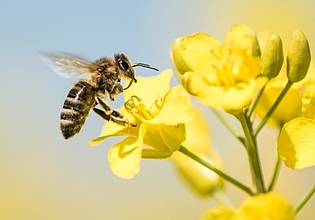Topic in Focus
Causes and Effects of Species Decline

Image: Adobe Stock / K. Thalhofer
According to the Intergovernmental Platform on Biodiversity and Ecosystem Services (IPBES) assessment report, the leading cause of species decline is changes in land use. These include increased sealing of soil, extensive building development, the loss of structural diversity in the landscape, and above all, ever-larger agricultural areas. Besides, agriculture has become industrialized. Whereas farmers used to cultivate small, diversified fields, today monocultures with high-yielding but species-poor arable farming culture predominate.
“Agriculture is a major factor just because of acreage size.”
The role of agriculture
Large areas of arable farmland displace rows of trees, hedges, loose stone walls, and fallow land. As a result, nesting sites, feed, and refuge for animals and birds are missing. The fields today are home to efficient plant species optimized for high yields. These often produce only a few repellents. Farmers, therefore, use fertilizers and pesticides such as glyphosate as a preventive measure, but over-fertilization makes it more difficult for plants and insects that require nutrient-poor soil to survive.
“Nowadays, corn is grown everywhere. It is cultivated in vast monocultures, which means that crop rotations are lost, and also the diversity of different field fruits and grains is lost. And then the use of glyphosate is clearly a major problem. The fields are already harvested in autumn, and new seeds are sown. That way, you have beautiful, even fields all winter long, and then you have good growth and a good harvest in spring. However, that means there is nothing left to eat for the birds that have usually found seeds in stubble fields during the winter. So, many things come together. We as scientists do not know exactly which of these factors is the worst. For each group of animals or plants it is probably a different factor that plays a role. The birds need hedges and such structures and if we want to have herbs on the fields, of course the use of glyphosate is fatal.”
Food security versus nature conservation?
Industrialized agriculture also supplies food and animal feed in Germany, and farmers' production decisions are largely based on international prices and market mechanisms. Some scientists say that our way of life and the nutrition of the population can only be maintained using large production areas with modern and efficient crops. Market value for biodiversity does not exist. Species protection does not have market relevance. The Leopoldina working group demands that market mechanisms and political framework conditions should be found to enable farmers to contribute to biodiversity protection without facing competitive disadvantages.
“One way forward could be that we will have to continue with intensive agriculture on the land available at present. Just how intensive and what intensive actually means is something that farmers and crop producers will have to comment on. They will still need efficient seeds, but at the same time - and this is the crux of the matter - it is vital that we provide sufficient biotopes and retreat areas for plants, animals, and microorganisms. Plus, these retreat areas have to be connected in a purposeful way to enable inhabitants to survive or to continue to live and exist. Here we are talking about structuring agriculture, linking biotopes with green belts, and perhaps transitioning to grassland and pastures more rich and abundant in species than at present. With regard to our typical field crops, I believe that we cannot afford our extensive agriculture in the long term.”
“It is quite clear that high meat consumption is a factor. We could feed a lot more people within a given area if everyone followed a more vegetarian and low-meat diet as opposed to particularly high meat consumption. So the reduction in productivity can actually be compensated to a considerable extent by how we eat as humans.”
The World Biodiversity Council warns of the incalculable consequences of species loss. Ecosystems have so-called tipping points where sudden and irreversible processes can occur. The processes and consequences differ depending on the ecosystem, time horizon, and assessment method. Given the complexity of ecosystems and the interaction between species and the environment, these tipping points are difficult for scientists to predict.
“We don't know when or how, but something will happen.”
Published: October 2020
Previous page: Why we need diversity of species
